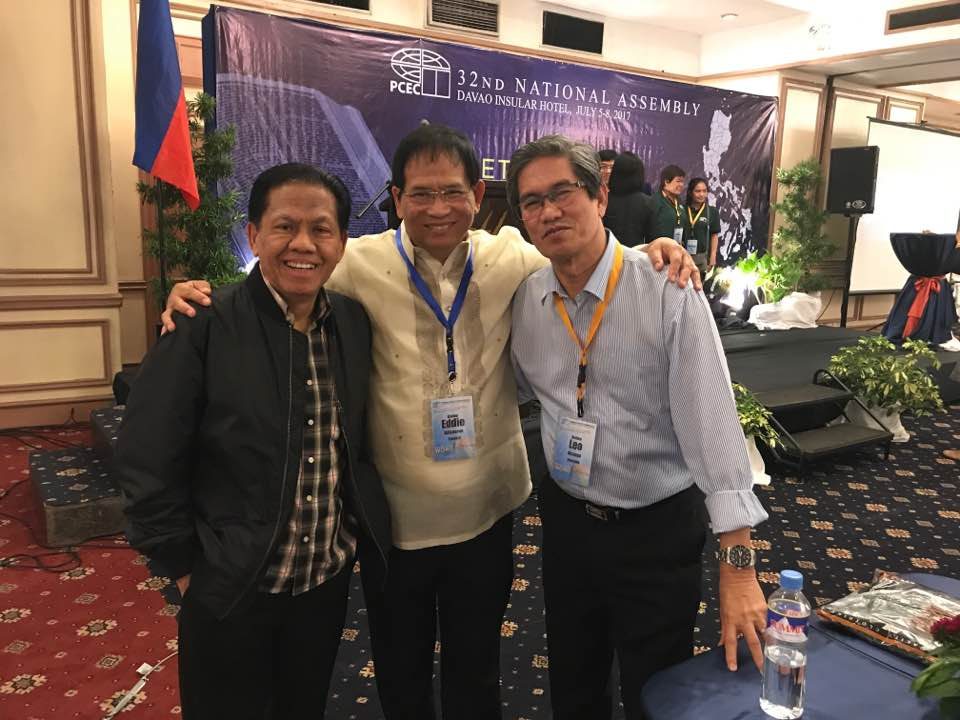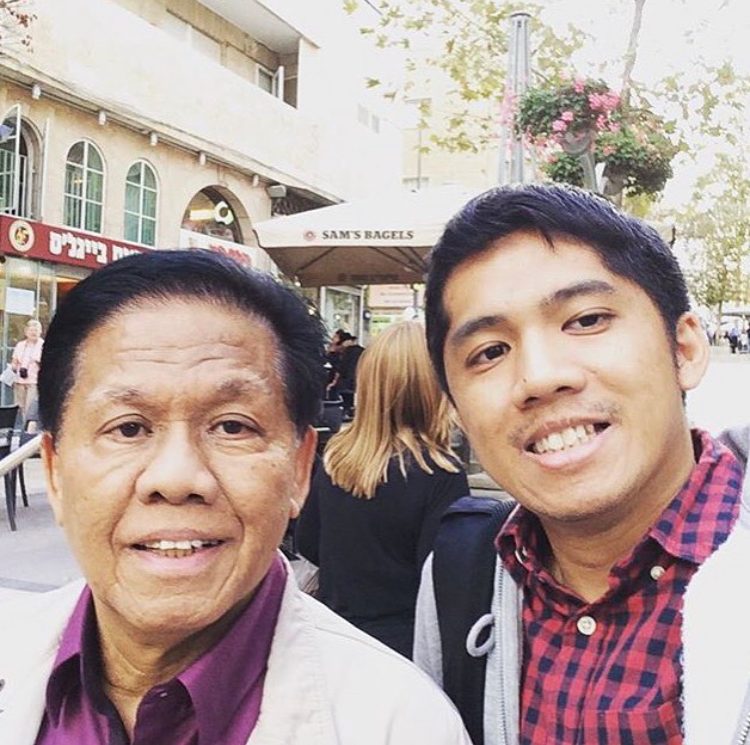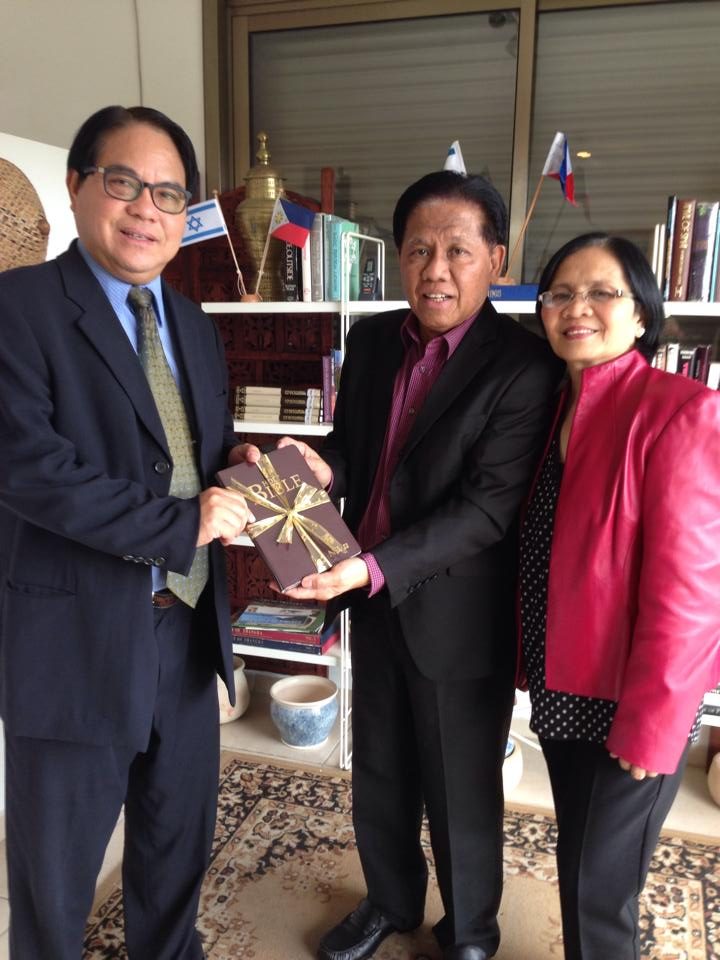SUMMARY
This is AI generated summarization, which may have errors. For context, always refer to the full article.
![[FIRST PERSON] My father’s faith and the inheritance he left me](https://www.rappler.com/tachyon/2023/06/jovie-galaraga-june-20-2023.jpg)
Jovelio Galaraga, usually called Pastor or Bishop Jovie, was a Filipino evangelical leader. He was an advertising professional who became a full-time minister in the early 1970s, and later was editor of Evangelicals Today and Asia Ministry Digest, pioneering evangelical publications in the Philippines.
In 2003, after then president Gloria Arroyo failed to convince Jesus Is Lord Church’s Bishop Eddie Villanueva not to run for the presidency, Bishop Jovie drafted the platform for his Bangon Pilipinas party and was his foremost communications adviser. He was hoping he’d become Villanueva’s press secretary, who had been his contemporary even before the former activist-turned-evangelist founded his megachurch in 1978.

Villanueva’s second son, the now Senator Joel Villanueva, regularly sought his counsel and Biblical knowledge.
“Lumaki po ako sa wings ni Bishop Jovie Galaraga,” Sen. Villanueva said. “I would truly remember, cherish, and treasure those moments na uupo ho ako with Bishop Jovie.”
The bishop had angioplasty shortly after the 2004 elections (which the elder Villanueva lost) and suffered a stroke in 2017. On the afternoon of Sept. 27, 2021, he died from a heart attack.
“Napakalaki ng kontribusyon sa aking karakter, sa paglago sa aking pananampalataya,” added Sen. Villanueva, in a video tribute during his funeral, held over Zoom in compliance with IATF regulations.
Bishop Jovie Galaraga was my father.

Pastor Romy Inton (Tito Romy) met him 50 years ago at Calvary Foursquare Church in Sta. Mesa. It was 1973 and Papa was just “saved” at Manila Bethel Temple (now the Cathedral of Praise). Saved is a term we use when one essentially converts to our version of Christianity.
“Unfortunately, the church split,” Tito Romy told me, who now lives in California. “The Filipino pastor and the American missionary had a falling out.” Papa was so digusted by what he witnessed that he left Manila Bethel and transferred to another church.
“Even before he went to Bible college, he was there faithfully attending the [Calvary] church and participating in whatever ministry,” he added.
They both attended Foursquare Bible College in Project 4, Quezon City, where Papa met my mom, Marilou Maglaya. A daughter of a Protestant minister and three years his junior, she was his teacher in a New Testament class. They got married on May 7, 1978, and the reception was potluck.
Together, they founded a church and ministered to other churches, and until around 2010, would travel all over the world to equip Filipino diaspora evangelical leaders. From 2011 until they became too ill to travel in 2015, they conducted Bible trainings in Tel Aviv, Israel, for Filipino caregivers who started their own evangelical fellowships.

I was in New York City when Papa died. On the evening of Sept. 26, 2021, my time (morning of Sept. 27, 2021 in Manila), the receptionist in the Ortigas condominium where we lived told me in a Facebook message that he was having a hard time breathing. I then called my brother who rushed to our place to assist him. And I spoke to him that night.
“Okay lang ako, my son,” I remember him telling me. But I had an uncomfortable nudge in my senses before I went to bed.
It was 17 months since Mama’s death from complications from breast cancer, and the pandemic kept my father, who genuinely loves people, from leaving the house, while grieving the loss of the woman he loves.
Around 6 am the following day, my phone showed that Pastor Roland Aquino (Kuya Rollie) was calling. He and his wife started the Victory Church in Queens, after my father commissioned him in 2009. His family has practically adopted me as their own.
“Leb, alam mo na ba?” (Leb, do you already know?) Kuya Rollie asked, using my nickname when I answered the call.
My brother said that after meeting Papa at home and bringing him for an emergency check-up at a nearby clinic, he told him they would head to St. Luke’s Hospital BGC for further tests. Papa said he wanted to rest first before heading to the hospital. He brought him to the condo and left to run an errand. When Papa was no longer answering the phone, he rushed back and found him in his room, slumped near his desk, with no heartbeat.
Mama had always told us about Papa’s desire to leave a giant sum to me and my siblings. It’s rooted from the fact that his prominence and stature didn’t translate to a good income – a reality that left me baffled, even as an adult. “Living by faith,” was a term I learned early in life. It’s ignoble in my view when applied to one’s finances. Both my parents were also against fundraising, saying that if you do God’s work, God will provide.
In 2016 when Rodrigo Duterte was a presidential candidate supported by numerous Filipino evangelical leaders, and when Trump came to power, I began to question my faith (even when I consulted for the Philippine Information Agency under the Duterte administration). As the French philosopher Jacques Derrida defined it, I deconstructed, and realized cracks in my belief system that skewed my view of the world.
I was a zealous evangelical as a teenager, attending a church different from my parents, and where my religious traditions and beliefs were shaped. In hindsight they were legalistic and exclusionary. I would be surprised when my evangelical leader parents would see me spend a lot of time in church and advise, “The church is good. But don’t make it your world.” I dismissed them as being “too familiar with God.”
As a younger evangelical, I saw those who didn’t share my belief as a bunch of bodies going to hell that needed to be saved, and conflated that church work automatically meant doing more for God. I was on fire, meaning I wanted everyone to believe what I believed.
But Papa, as committed to the evangelical movement as he was, put a premium on treating everybody well. “Walang masamang tinapay sa kanya,” said Pastor Gerry de la Paz (Tito Gerry), who first worked with him in 1986, when Papa commissioned him to lead a church in Karuhatan. Tito Gerry said that his brand of Christianity is to be a “friend to everyone.” Papa, who officiated Tito Gerry’s wedding, dedicated all his four children (our version of baptismal rites), and delivered the committal rites to both his parents.
“He never misses the chance to greet us on all our important milestones, anniversaries, and birthdays, kahit wala pang Facebook na nagre-remind ng birthdays noon,” Tito Gerry said.
Also, not once did I hear a denigrating word in the pulpit or in private from Papa about those who didn’t share our beliefs. He also showed respectful curiosity towards my Jewish and Muslim friends and held in high regard the Roman Catholic church. Evangelism or sharing our faith, he believed, starts by living a life centered on love the way Jesus did.
Papa spurred me to dream and declared prosperity, joy, and fulfillment over me and my siblings. When we were younger, he would dream out loud about us attending an Ivy League school. It sounded delusional. In 2019, I graduated from Columbia University with a Master’s degree in journalism.
Kuya Rollie has been asking me for years about what I’ll do with my book, The Power of Speaking Life, which is inspired by my parents’ life. Several days ago, I told him I was ready to talk about it and would reach out to pastors, so I could share the message in their churches.
“A lot of doors would open for you, because of your Papa,” he said, after enumerating pastors from Hong Kong, Israel, California, and the whole tri-state who maybe willing to help.
“While you don’t see millions in his bank account, ang makikita mo ay names of people, families, organizations that have received yung contribution ng Papa mo,” said Tito Gerry. “If you could measure the gratitude, lagpas pa yun sa billions, more than the tangible things.”
Papa’s desire to give us a big material inheritance was not fulfilled. But he left behind something that Proverbs 22:1 described as one having greater value.
“Choose a good reputation over great riches,” it reads in the New Living Translation, “being held in high esteem is better than silver or gold.” – Rappler.com
Caleb Maglaya Galaraga is a freelance writer and religion reporter. He first contributed to Rappler eight years ago. His writing has appeared in the Times of Israel, the Jerusalem Post, Religion Unplugged, and the Episcopal News Service. He lives in New York City.
Add a comment
How does this make you feel?
![[OPINION] The problem with feel-good Christianity](https://www.rappler.com/tachyon/2022/02/tl.jpg?fit=449%2C449)



![[OPINION] How I became friends with my father](https://www.rappler.com/tachyon/2023/06/20230620-how-i-became-friends-with-my-father.jpg?resize=257%2C257&crop=293px%2C0px%2C720px%2C720px)





There are no comments yet. Add your comment to start the conversation.